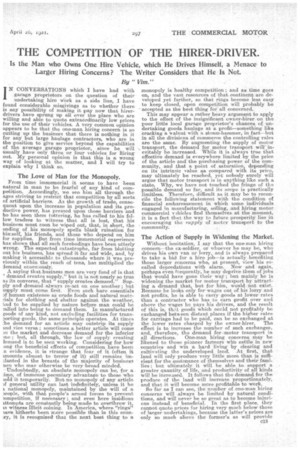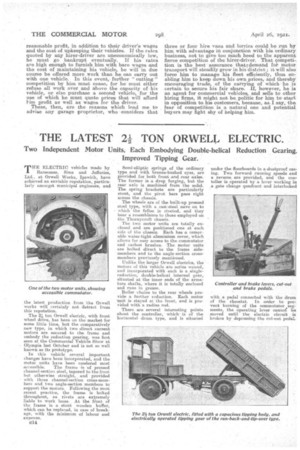THE COMPETITION OF THE HIRER-DRIVER.
Page 9

Page 10

If you've noticed an error in this article please click here to report it so we can fix it.
Is the Man who Owns One Hire Vehicle, which He Drives Himself, a Menace, to
Larger Hiring Concerns ? The Writer Considers that He Is Not.
By IX CONVERSATIONS which I have had with garage proprietors on the question of their undertaking hire work as a side line, I have found considerable misgivings as to whether there LS any p-oesibility of making it pay now that hirerdrivers have sprung up all over the place who are willing and able to quote extraordinarily low prices for the use of their vehicles. A very common opinion appears to be that the one-man hiring concern is so cutting up the business that there is nothing in it for any but large haulage contractors, who are in the position to give service beyond the capabilities of the average garage proprietor, since he will Usually have only three or four vehicles for Hiring out. My personal opinion is that this is a wrong way of looking at the matter, and I will try to explain why I think so.
The _Love of Man for the Monopoly.
From time immemorial it seems to have been natural in mail to be fearful of any kind of competition. Accordingly, we see him all through the ages striving to restrict that competition by all sorts of artificial barriers. As the growth of trade, eonsequent upon the increase in population and its productive power, has pressed upon those barriers and he has seen them tottering, he has called to his fellow traders to witness that all is lost, that his business must soon be wiped out, that, in short, the ending of his monopoly spells blank ruination for himself, his friends, and those who depend on him for supplies. But from time immemorial experience has shown that all such forebedings have been utterly wrong. The expected catastrophe, far from blotting out his business, has spread it far and wide, and, by making it accessible to thousands where it was previously within the reach of tens, has multiplied the em and enormously. A saying that.busmess men are very fond of is that
demand creates supply," but it is not nearly so true VA its converse, that ,stropIy creates demand." Supply and demand alwa.ys resa.ct on one another ; but supply must come first. Even such bare essentials if human existence aS crude foods and natural materials for clothing and shelter against the weather, had to be supplied by nature before man could be iallect into being to demand them. In manufactured ;too& of any kind, not excluding facilities for transs,orting goods, the same principle operates. At times ;he demand for an article may outstrip its supply sad vice versa' sometimes a better article will come mi the market and decrease demand for the inferior )ne ; but, all through, The law of supply creating lei:nand is to be seen working. Considering for how on the beneficial effects of comisetition have been n evidence, it is strange that fear of it (often it mounts almost to terror of it) still remains isnAanted in the breasts of the majority of business nen who may otherwise be very broad minded. Undoubtedly, an absolute monopoly can be, for a ime, of immense pecuniaryadvantage to those who mid it temporality. But no monopoly of any article sf general utility can last in-definitely, unless it be 1 national monopoly, maintained by the will of a seople, with that people's armed forces to prevent mmpetition, if necessary ; and even here insidious ittempts are constantly being, made to overthrow it, is witness illicit coining. In America, where "rings" lave hitherto been more possible than in this eounay, it is recognized that the next hest thing to a
monopoly is healthy competition ; and as time goes on, and the vast resources of that continent are developed yet further, so that rings become less easy to keep closed, open competition will probably be accepted as the best thing for all concerned.
This may appear a rather heavy argument to apply to the effect of the insignificant owner-hirer on the poor little local garage proprietor's chances of undertaking goods haulage at a profit—something like cracking a walnut with a steam-hammer, in fact—but in all the divisions of commeree the controlling rules are the same.. By augmenting the supply of motor , transport, the demand for motor transport will inevitably be increased. While it is always true that effective demand is everywhere limited by the price of the article and the purchasing power. of the community, and that a point of saturation, depending on its intrinsic value as compared with its price, may ultimately be readied, yet nobody surely will argue that motor transport is in anything like eueh a state. Why, we have not touched the fringe of the possible demand so far, and. its scope is practically limitless. .Therefore, difficult as it may be to reconcile the following statement with the condition of financial embarrassment in. which some individuals engaged in manufacturing, selling, and hiring motor commercial vshieles find themselves at the moment, it is a fact that the way to future prosperity lies in encouraging the. supply of meter transport to the community.
The Actionof Supply in Widening the Market.
Without hesitation, I say that the one-man hiring concern—the ex-soldier, or whoever he may be, who drives his .01Arri van or lorry, and is always prepared to take a bid for a hire job—is actually benefiting those larger concerns who, at present, view his socalled depredations with alarm. Now and again, perhaps even frequently, he may deprive them of jobs that would have gone their wag; but mainly he is widening the market for motor transport by attract. ing a demand that, but for him, would not exist. Because he looks only for-wages out of his lorry and not profits, he is able -to carry goods at lower-rates than a contractor who has to earn profit over and above the wages he Pays his drivers, and the result of this is thst goods which could not profitably be exchanged between distant places if the higher rates for carriage had to be paid, can be so exchanged at the lower rates charged by the owner-hirer. The effect is to increase the number of such exchanges, and, therefore, the demand for ,motor transport in all directions. One-man hiring concerns may be likened to those :pioneer farmers who settle in new oonntries and win a hard living by clearing and cultivating the undeveloped land. At first,. that land will only produce very little more than is sufficient for the sustenance of themselves and their families ; but ultimately it Will he able to support a greater quantity of life, and Productivity of all kinds Will be increased. It follows that the demand for the produce of the land will increase proportionately, and that it will become mere profitable to work.
So far as I can see, the nember of one-man hiring concerns will always be limited by natural conditions, and will never be so great as to become injurious instead of beneficial. In the first place, they cannot quote prices for hiring very much below those of larger undertakings, because the latter's prices are only so much above the former's as will provide
reasonable profit, in addition to their driver's wages and the cost of upkeeping their vehicles. If the rates quoted by any hirer-driver are uneconomically low, he must go bankrupt eventually. If his rates are high enough to furnish him with bare wages and the cost of maintaining his vehicle, he will in due course be offered more work than he can carry out with one vehicle. In this event, further "cutting" competition by him must cease, for he must either refuse all work over and above the capacity of his vehicle, or else purchase a second vehicle, for the use of which he must quote prices that will afford him profit as well as wages for the driver. These, then, are the reasons which lead me to advise any garage proprietor, who considers that three or four hire vans and lorries could be run by him with advantage in conjunction with his ordinary business, not to give too much heed to the apparent fierce competition of the hirer-driver. That qompeti-. tion is the best assurance thatIdemand fol. motor transport will steadily grow in his district ; it will also force him to manage his fleet efficiently, thus enabling hin to keep down his own prices, and thereby encouraging trade, of the carrying of which he is certain to secure his fair share. If, however, he is an agent for commercial vehicles, and sells to other hiring firms, it might not be politic for him to start in opposition to his customers, because, as I say, the fear of competition is a, natural one and potential buyers may fight shy of helping him.
































